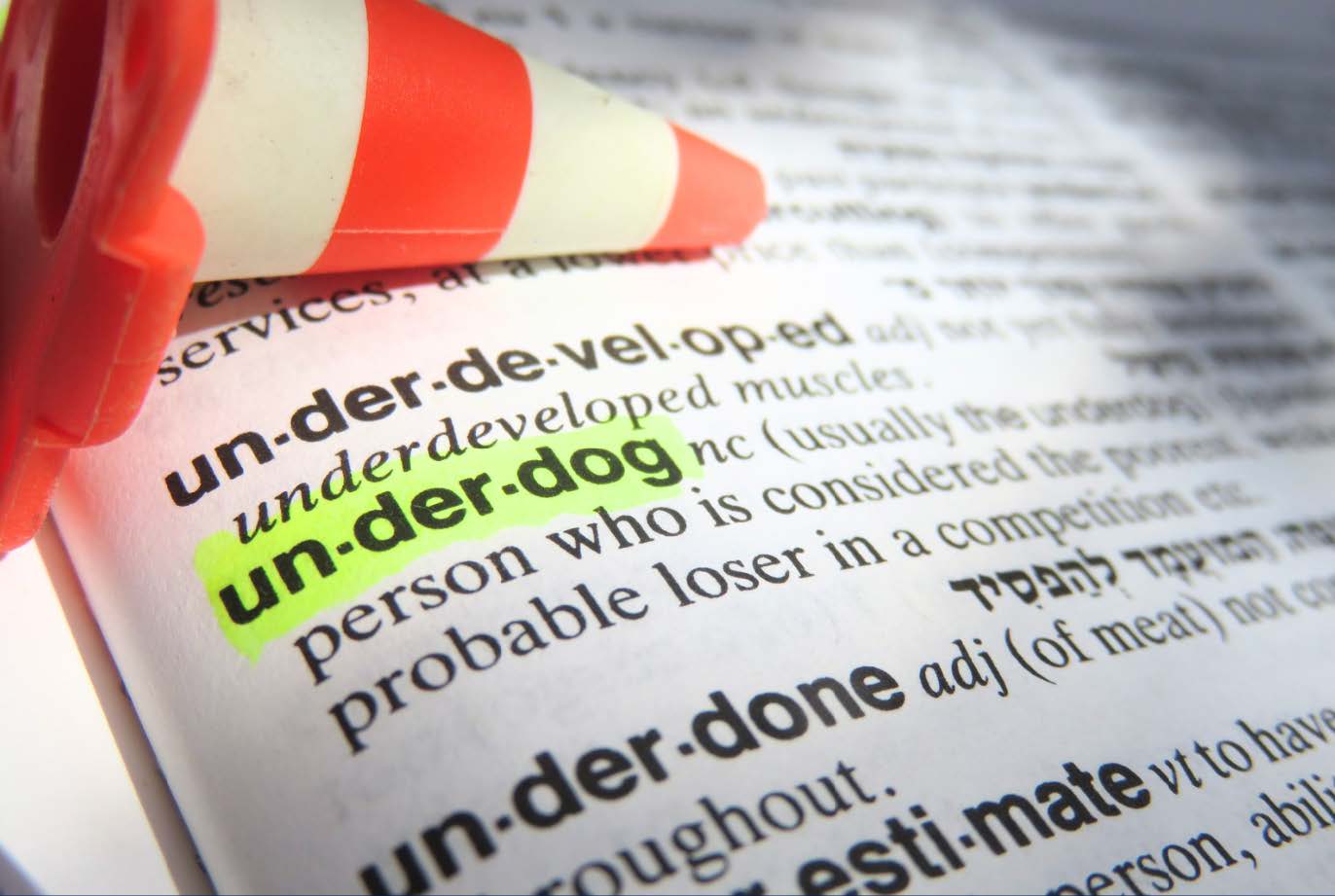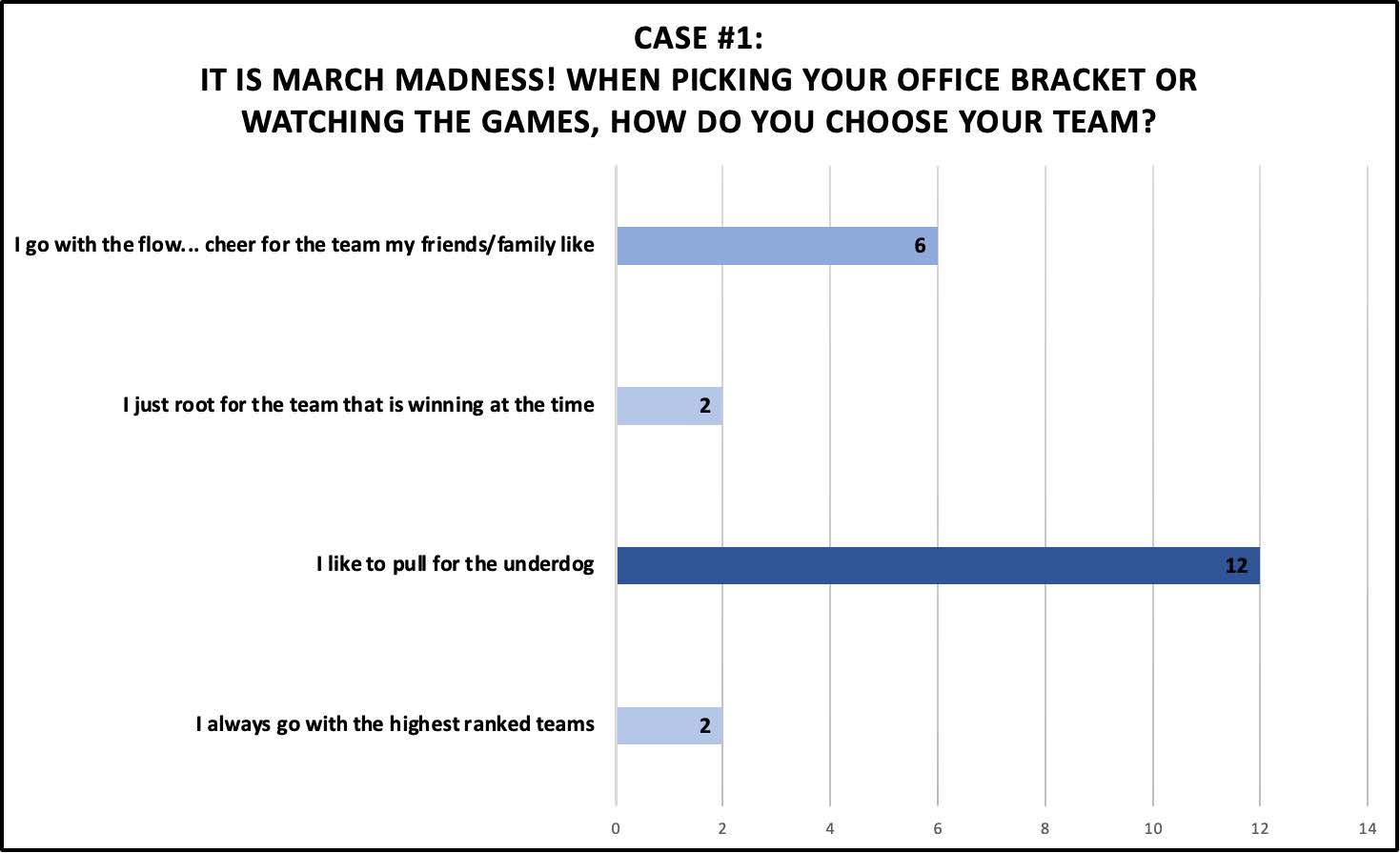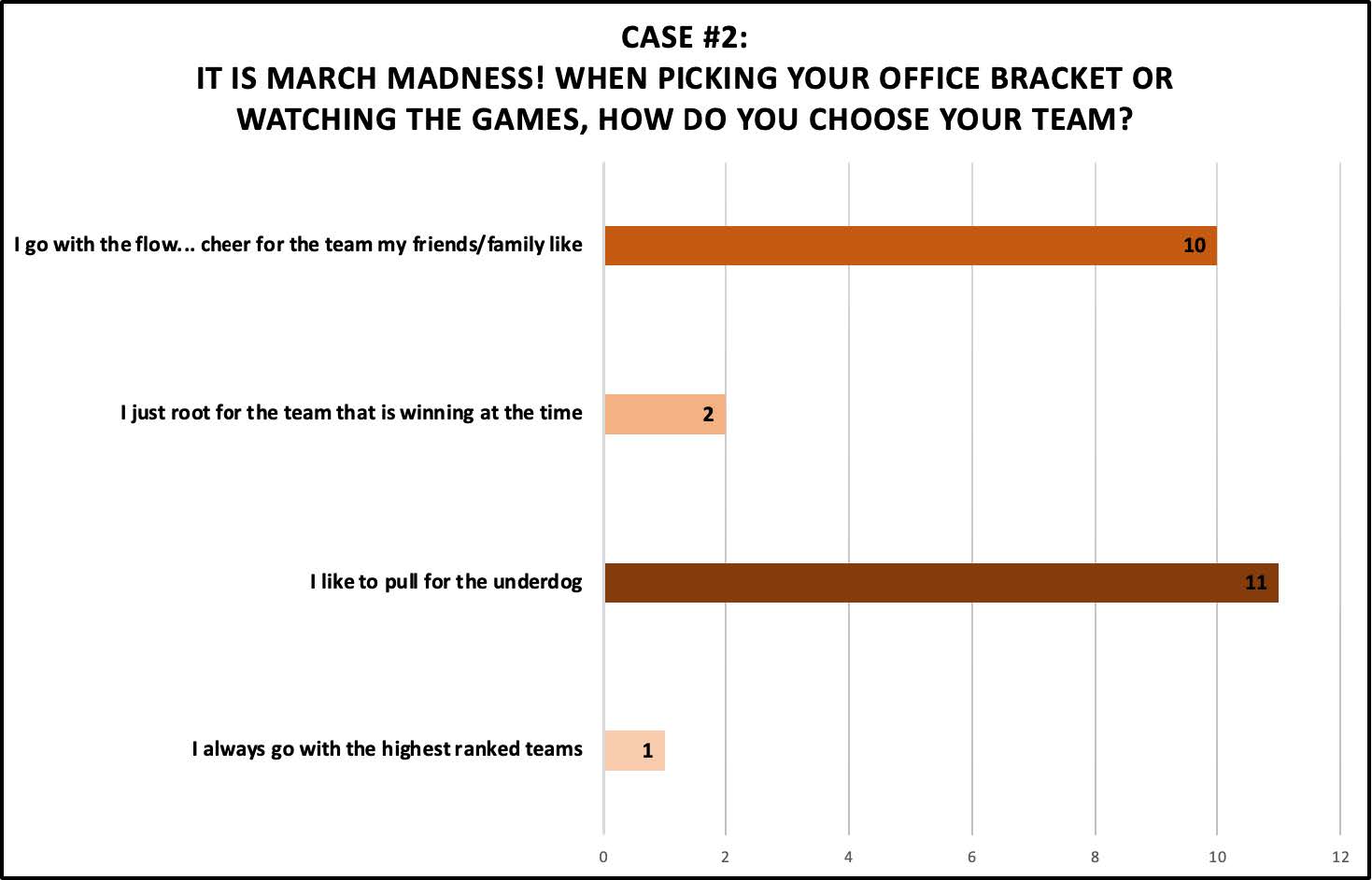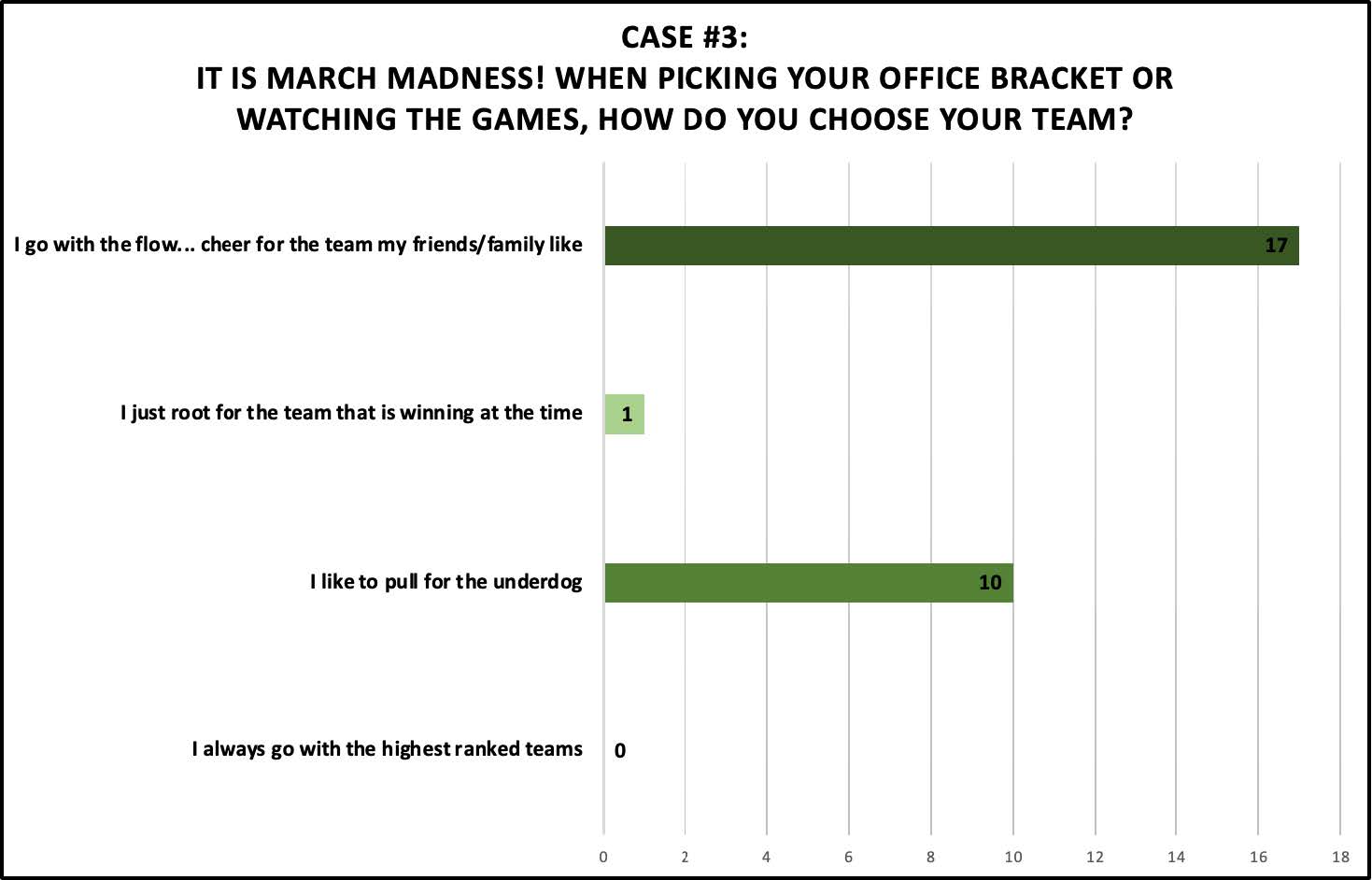 |
If April showers bring May flowers, what does March bring? This year it was crushed brackets as unprecedented wins by Cinderella teams made their way into the Final Four. Traditional water cooler chatter was replaced by discussions about top seeded teams being bested by lower ranked teams. With the obvious choices gone in the first weekend, who would we root for? The Underdog, of course.
What is it about an underdog that gets us to our feet, rooting for them, even when we know that the odds are against them? And, if that works in movies, does the same work with our jurors? Are jurors sitting in the jury box waiting to cast a stone at the defendant they perceive to be Goliath while cheering for David? Research shows that Americans prefer the underdog to the favorite in many settings and for many
reasons. A recent experiment showed that about two-thirds of people rooted for an underdog over the favored team in a controlled basketball game. Delving into the psychology further, the study found participants liked the underdog’s “unexpected triumph” over the champion team.1 Psychologists consistently findthat people get more joy out of unexpected successes than expected ones.2 3
This joy gives us hope and makes us feel good about ourselves long after the game is over. Studies have shown that the literal act of witnessing an underdog story gives us hope. If we walk out of the theater after watching classic underdog tales like Rocky, the impact of experiencing the protagonist’s ascendance fills us with a newfound sense of confidence. And this isn’t a fleeting feeling. We carry this feeling with us for several days.4
Underdogs are “relatable.” Another reason we root for the underdog is because we may feel a sense of empathy and connection with those who are perceived as weaker or less powerful. This is particularly true when the underdog has faced adversity or has been victimized in some way.
Another, albeit a more psychologically darker, reason for liking the underdog isn’t about the underdog itself – it’s about the favorite: We want the losers to win because we enjoy the pain of a winner losing. The term is “schadenfreude,” the experience of pleasure at the misfortune of others.5 Thomas Aquinas, explaining this concept another way in his work Summa Theologica, calls it “Sorrow at another’s good,” an inverted explanation of this desire for the winner’s downfall6 So, if we believe another person who has more money or a higher social status, particularly if we think they may have achieved their status unfairly, experiences failure and misfortune, that produces a “heady cocktail of status and fairness” at zero cost to us.7 Thus, rooting for the underdog can satisfy a subconscious need for fairness and a desire for a “just result.”
This desire for fairness translates into how people view many things in life. For instance, teams that have the ability to afford the salaries of the best players raise the ire of fans. A perfect example of this is the New York Yankees. Google “Why don’t we like the Yankees,” and #13 is “They’re Not Underdogs.”8 The author suggests “no team really wants to be the underdog, but the teams that are seem to be generally liked more than the overpowered teams they play. The Yankees seem like bullies playing against the smaller market teams that they have outspent 2 to 1 on everything.”9
Wanting to see how jurors would align with these underdog theories, we asked several mock jury panels during March Madness how they selected their own brackets. Would jurors see themselves as underdogs in their own lives and identify with the struggle of the perceived weaker party in the case? Would there be any correlation with whom the juror rooted for and who “won the case?” Would jurors be more likely to side with the party that is perceived as weaker or less powerful, regardless of the merits of the case?
In Case #1 (graphic below), the jurors overwhelmingly indicated they rooted for the underdog before the trial began. How did this “underdog bias” affect their decision making throughout the mock trial? Significantly, it seems.
 |
This was a case involving an estate of the deceased plaintiff suing multiple corporate entities and an individual defendant. Although there was much debate surrounding the deceased’s responsibility in their own death, jurors were hesitant to blame the decedent or the individual defendant. Instead, most of the responsibility ended up on the corporate defendants’ shoulders. During individual verdicts, the average amount of responsibility allotted to the decedent was 10%; however, during group deliberations, the deceased received an average of 4% responsibility. Additionally, the individual defendant ended up with 23% of the responsibility, despite their large part in the situation, and the corporate defendants were left with the majority of the fault.
In Case #2, almost half of the jurors indicated they pulled for the underdog. Of note in this group, the strongest Plaintiff-leaning jurors selected the “underdog”response and made their opinions about underdogs well-known to the other jurors.
 |
For our final case analysis of the underdog theory, ten of our twenty-eight jurors indicated that they liked to root for the underdog. Two of our three deliberation groups had forepersons who were rooting for underdogs…and let the other jurors know that the Plaintiff in the case was definitely an underdog. The plaintiff in this case had a wealthy lifestyle that was displayed to the jury through testimony and videos. Almost all of the jurors commented on the fact that they could not afford such expensive cars and boats. As the deliberations went on, those comments turned to contempt. Ultimately, most jurors declined to award the plaintiff any compensation for his claimed injuries even though there was strong anti-corporate defendant sentiment at the beginning of the case. Was this schadenfreude in action?
 |
Looking at the three cases together, just 4% of the jurors indicated they root for the highest ranked team. Why is that important? Thinking back to the Yankee’s discussion, were the jurors unconsciously indicating that they would have a more difficult time finding for the party who had more money or more advantages? Would those jurors secretly want a successful party to lose simply because that party had achieved success in ways they had not?
Our analysis provided some useful information about how jurors who favor underdogs see the litigants and how that can impact the outcome of the trial. Acknowledging the very limited scope of these findings, there are some takeaways that are useful when dealing with clients who may be perceived as an underdog or a bully. How can trial attorneys use the underdog effect to be successful in their trial presentations? Here are the top tips to use in your next case:
- Understand why jurors may root for the underdog. Know the psychology behind key concepts such as “schadenfreude.”
- Consider structuring your case to highlight your client as the “underdog.” Is there a way to make her more “relatable” to the jury? Are there habits that your client has that may distract the jury from the issue at hand?
- Identify the jurors who favor the underdog. Use individual voir dire, if possible, to determine the juror’s allegiance to a favorite sports team or maybe ask if she’s a Yankees fan.
- Continue the theme. As our three case studies indicated, having a strong and consistent case theme is essential, particularly when your client is a corporate defendant.
March Madness has come and gone, but the insights gained from our jurors are invaluable. All jurors come to the courthouse with ingrained biases and strong opinions so use that to your client’s advantage. Would ensuring the jury sees your client as the underdog be beneficial in every case? Of course not, but having awareness that the jury may be rooting against your client is critical. Keeping these lessons in mind will help counsel focus the attention where it needs to be to get the results your client deserves. Here’s rooting for you!
Kristi Harrington is a trial consultant with First Court, Inc. As a retired circuit court judge, Kristi presided over hundreds of jury trials. Kristi is a Distinguished Visiting Professor and former Director of Advocacy at Charleston School of Law.
1 Stromberg, Joseph. “The Science of Why We Love to Root for Underdogs,” Vox (Vox, March 20, 2015), https://www.vox.com/2015/3/20/8260445/underdogs-psychology.
2 “Decision Affect Theory: Emotional Reactions to the Outcomes of Risky …,” accessed April 13, 2023,
https://www.jstor.org/stable/pdf/40063228.pdf.
3 Shepperd JA;Mcnulty JK; “The Affective Consequences of Expected and Unexpected Outcomes,”
Psychological science (U.S. National Library of Medicine), accessed April 13, 2023,
https://pubmed.ncbi.nlm.nih.gov/11892785/.
4 “Why Do We Love Underdog Stories? Psychology Weighs In,” Psychology Today (Sussex Publishers),
accessed April 13, 2023, https://www.psychologytoday.com/us/blog/mind-brain-and-value/202101/why-do-we-love-underdog-stories-psychology-weighs-in.
5 Dean Burnett, “Schadenfreude: A Psychologist Explains Why We Love to See Others Fail,” Why does Schadenfreude exist? A psychologist explains | BBC Science Focus Magazine (BBC Science Focus Magazine, October 18, 2021), https://www.sciencefocus.com/the-human-body/why-does-schadenfreude-exist/.
6 “Question 36. Envy,” SUMMA THEOLOGIAE: Envy (Secunda Secundae Partis, Q. 36), accessed April 13, 2023, https://www.newadvent.org/summa/3036.htm#:~:text=ii%2C%2014)%20calls%20envy%20a,can%20be%20about%20another’s%20good.
7 Dean Burnett, “Schadenfreude: A Psychologist Explains Why We Love to See Others Fail,” Why does Schadenfreude exist? A psychologist explains | BBC Science Focus Magazine (BBC Science Focus Magazine, October 18, 2021), https://www.sciencefocus.com/the-human-body/why-does-schadenfreude-exist/.
8 Griffin Leyden, “Top 15 Reasons People Hate the New York Yankees,” TheSportster, March 13, 2016, https://www.thesportster.com/baseball/top-15-reasons-people-hate-the-new-york-yankees/#13-they-re-not-underdogs.
9 Ibid, (emphasis added).